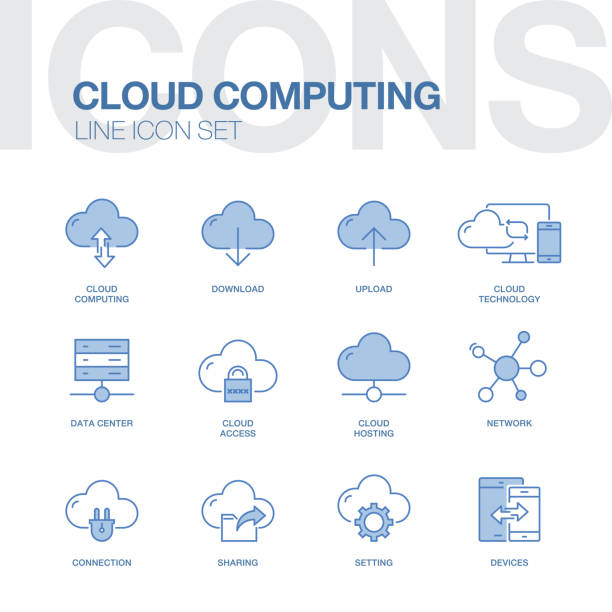Cloud Hosting
Living in the age when not only businesses but people also rely on websites, applications, and even digital storage, the concept of Cloud Hosting has become a necessity. Being a content creator who wants to open your site on the web within a shorter period of time, or being a startup that wants to achieve scalability, Cloud Hosting offers indispensable benefits over the established web hosting. This guide will explore all that you need to understand about Cloud Hosting, including how it operates and how this made it the preference of the majority of people in the contemporary digital economy.

What Is Cloud Hosting?
Defining Cloud Hosting
One of its types of web hosting is in terms of utilizing a number of intercom servers which are geographical distributed. Contrasting with the traditional hosting in which your site was hosted by a single machine, Cloud Hosting places your data and resources on numerous types of virtual servers, which ensures a higher degree of reliability, scalability and performance. Such distributed paradigm enables businesses and individual users to easily scale up the operations and support levels of services even when there are sudden surge in web traffic.
How Cloud Hosting Works
Instead of keeping your site on one physically located server, Cloud Hosting diffuses its data among a row of servers that are often located in data centers across the globe. Each time an individual visits your site, the request is sent to the most optimized server, at the moment, which is usually optimized to enhance the speed and responsiveness. This way you will not have singular points of failures i.e. should one server fails; the other will absorb the load and everything will continue to work fine. The synergy that these virtual environments give is the ability to emulate the same facility of a physical server without a loss of 100 percent uptime and continuity of service.
Advantages of Cloud Hosting
On-demand scalability
The potential to scale its resources in an instant is amongst the key advantages of Cloud Hosting. Under a scenario of surges in traffic, the cloud environment can allocate extra resources to maintain its performance. It works great with e-commerce shops when they are in the sale areas or Blogs that get viral traffic. It will not only scale on the traffic management, but also on databases, memory and processing power, so your operation will be as smooth and continuous as possible no matter how many users you have at the point.
Enhanced Reliability
PS has lots and lots of servers thus it offers so much more up-time than standard shared or VPS hosting. Little downtime is obtained because in case of hardware failure, this is immediately replaced via another server. This redundancy will ensure that there is minimal service downtime even in mission-critical applications thus making the customers experience greater trust and satisfaction.
Cost Efficiency
is of pay-as-you-go formatted. Customers pay the resources they utilize making it potentially more economically possible than on prepayment of a standard rate on resources they are never using. This form of pricing is extremely appealing to small business and startups which are on a tight budget. Instead of resource allocation based on estimations, you can eliminate it altogether and allocate and scale resources as needed on a per-traffic basis.
Superior Performance
Websites on cloud also have optimized response-time of the servers, load-balancing, and also low latency. Cloud Hosting services are also provided where the content is put near the nearest server location globally to provide better and faster user experience and speed of access. This assists in enhancing user experience and it can significantly enhance conversion rates of businesses.
Security Benefits
Hosting services also improve security measures including firewalls, intrusion detection areas, DDoS defenses, and backup of your data. These features ensure a higher degree of security than the majority of the conventional hosting provides. Furthermore, the greater part of the providers can comply with specific industry standards of compliance, such as GDPR, HIPAA, PCI DSS; this is crucial to the organizations that handle sensitive data or are obliged to follow the compliance regulation.
Types of Cloud Hosting
Public Cloud
Public Cloud Hosting means the servers which are shared among over two users. It is free in every way possible and is only affordable among small to medium Business or personal blogs that do not require custom configuration. The scales of such environments, their reliability and non-complexity of operations are high, and there is no necessity to cope with infrastructure.
Private Cloud
A personal cloud is dedicated to a particular organization. This is more accommodating and provides control and therefore the choice can be used in large businesses or in one that is dealing with sensitive information. It allows organizations to coil access and treat the cloud infrastructure as an extension of their local IT network.
Hybrid Cloud
Hybrid Cloud Hosting combines features of both classes of cloud environments, i.e. public and privately hosted. It allows businesses to carry on with substantial loadings within a privately hosted cloud and utilize the public cloud with jobs that are less significant. This agility plays an essential role in organizations that must simultaneously be agile and compliant with the rules.
Who has to Use Cloud Hosting?
Small Businesses
Provides small companies with opportunity to obtain a company level framework at a comparatively low cost and no huge investments would be necessary. This is possible because of such functions as convenience in scaling and automatic backups, allowing the smaller teams to manage their online presence. It even gives them the ability to compete on an equal footing with larger players because they are potentially capable of offering comparable speed, availability, and security.
E-commerce Websites
Online shops may experience traffic variability and also demand high availability. Cloud Hosting constitutes a perfect fit as it can handle high traffic load without affecting performance. Reliability and speed of the services offered to the customer and reliability and speed on such features like automatic fail over and real-time load balancing are directly impactful on sales and retention of a customer.
Producers, SaaS Providers and Developers
Cloud Hosting it is makable, easy to rollup, and combines the APIs to enable the exercise of agile development by the developers. The application developments and deployments are also facilitated by containerization tools and infrastructure as a code (IaC).
Content Creators and Bloggers
The bloggers also need good hosting that is capable of serving traffic anywhere around the world. Cloud Hosting provides fast page load and less downtime that optimizes page rank and the experience of the audience. Additionally, multiple Cloud Hosting providers make it easy to deploy CMS and grow with the audience.
Governmental Agencies and Companies
Above satisfaction: Governments and large companies require secure, compliant hosting that is as tight as possible. Cloud Hosting goes beyond such requirements and frequently surpasses them given its phenomenal security, fail-sounding and cross-border, in terms of regulatory criteria.
Significant insights on what to consider in a Cloud Hosting Provider
Resource Allocation
Any provider you choose should permit customization of the CPU, RAM, and storage to fit your current requirements. Elasticity is one of the inner strengths of Cloud Hosting. Real-time resource constructions ensure your program sustains an optimum performance without necessarily having human participation.

The Data Centers locations
The latency is overcome by international data center providers since your content could be delivered using a server that is closest to your geographical position. This adds to user experience tremendously to a global audience. Besides, multiple data centers also provide geographical redundancy which improves disaster recovery.
Uptime Guarantee
Require 99.9 percent up-time guarantee. Good Cloud Hosting services install infrastructure to ensure their services are as reliable as possible. Certain providers will offer service-level agreements (SLAs) that will identify an uptime monetary value that is greater than an agreed-upon baseline.
Security Protocols
Ensure such capabilities in your service provider as DDoS protection, data encryption, fireware control, and auto backups. These are vital talents in data security of yours. Multi-Factor Authentication (MFA) and Identity and Access Management (IAM) systems also have the support of advanced Cloud Hosting providers.
Customer Support
There is a need to be able to provide live chat, ticket requests, and knowledge bases 24/7, Cloud Hosting the complexity of the configuration may be involved and thus qualified support is of highest priority. Some of the providers also offer onboarding support as part of training and certifying support engineers.
Popular 2025 Providers de
AWS Amazon Web Services
The AWS extends one of the broadest Cloud Hosting solutions. They offer computing power, storage and machine learning, etc. Despite the fact it could be referred to as more preferable in case of an experienced user, AWS is one of the best alternatives. AWS also includes auto-scaling, elastic load balancing and monitoring.
Google cloud Platform (GCP)
It is performance-centered, easily used with the rest of the Google services and thus would fit those developers and firms that already have the working conditions within the Google environment. The Company has capabilities in data analytics and artificial intelligence which are the industries best and hence favourite by the company in the application of data centric applications.
Microsoft Azure
Azure has gained popularity in the enterprise level and has excellent opportunities in the hybrid cloud. It also appeals to Windows based companies due to its compatibility with Microsoft products. Azure is also integrated with various development frameworks including .NET, Java, Python and so on.
DigitalOcean
Digital Ocean is uncomplicated and makes it easy to use with an intended market at small business ventures and developers. It is to manage Cloud Hosting easily, has and an intuitive dash board, and support of Kubernetes, and pre-configured application stacks.
Cloudways
Cloudways simplifies Cloud Hosting since it offers managed services alongside other clouds systems like AWS and Google Cloud. Best suited to those that want cloud muscle, but discard the technicalities. The hosting provided by Cloudways is very powerful, which is achieved with the help of such features as automatic backups and performance optimization.
How Cloud Hosting Raises the SEO
Quick loading speeds
Page speed is one of the ranking factors of Google. The worldwide CDN and resource distribution allow rapid loading of websites increasing the SEO index. Quicker functions do away with bounces, and they increase the time used on your site.
Better Uptime
Downtimes also expose search engine crawling to losses of ranks. Your site would be accessible through Cloud Hosting with high availability sparing your SEO efforts. The maintenance of a stable index will allow the search engines to put its trust on the sites that will be available all the time.
Enhanced Security
Search engines and even users love secure sites. With assets like SSL certificates and firewalls, Cloud Hosting helps in one kind of reliable site management. Security attacks can also lead to search engine black listing hence Cloud Hostingindirectly securing your SEO.
Mobile Optimization
Cloud Hosting environments are usually supporting receptive design elements and caching in order to increase mobile usability, which is the other SEO ranking factor. There are also options of monitoring and optimizing mobile pages during the cloud performance.
Globalisation and localisation
You can also offer local content with the assistance of CDNs and multiple data centers distributed all over the world, which is essential in international SEO with Cloud Hosting. Development and delivery of region specific content also promotes user engagement and conversion.
Cloud Hosting vs. Other Hostings
Shared Hosting
The shared hosting is cheap and poor and the speed is slow. It is suitable as an entry-level pack but not beneficial to growing businesses or websites. It is a resource-strapped system that is easy to crack, and frequently experiences downtimes, therefore, it is improper to operate professional-level operations on it.
VPS Hosting
VPS may offer dedicated resources within a single server but, nevertheless, cannot maintain redundancy and scalability as offered by Cloud Hosting. In comparison to shared hosting, VPS is better but introduces one to vulnerabilities such as single points of failure, and an acquisition of a complex upgrade path.
Dedicated Hosting
Dedicated servers are very high performing and also fully under control though they are very expensive and lack the flexibility of Cloud Hosting. You will also have full responsibility of the servers. Unlike Cloud Hosting, dedicated hosting lacks auto-failover and global scaling.
Future of
As more state-of-the-art technologies like AI, IoT, and 5G find their way into the business and life of every single person in the world, Cloud Hosting will further acquire the additional importance. Application deployment, scaling, and security as a critical infrastructure will Cloud Hosting enter the construct. Edge computing, serverless storage, and orchestration of containers (including Kubernetes) are rapidly becoming the future of an Cloud Hosting. The new introduced advancements will grant developers and businesses stronger and more versatile power.
Moreover, the sustainability ecology of Cloud Hosting is increasing. On their part, most Cloud Hosting providers are also coming up with eco-friendly data centers and energy-efficient infrastructures to help their client have adequate opportunities to reduce their carbon footprint.
📊 Cloud Hosting Summary Table
| Category | Details |
|---|---|
| Definition | Cloud Hosting uses multiple virtual servers distributed across global data centers to host websites or applications, unlike traditional hosting with a single server. |
| Working Mechanism | Distributes traffic to the most optimal server at any moment. If one server fails, others take over—ensuring uptime and performance. |
| Advantages | ✅ On-demand scalability ✅ Enhanced reliability ✅ Cost-efficiency (pay-as-you-go) ✅ Superior performance ✅ Strong security features |
| Types of Cloud Hosting | 🔹 Public Cloud: Shared resources, budget-friendly 🔹 Private Cloud: Dedicated resources for one organization 🔹 Hybrid Cloud: Combines both, balancing control and cost |
| Best Suited For | – Small Businesses – E-commerce Websites – SaaS Providers / Developers – Bloggers / Content Creators – Government & Enterprises |
| Key Provider Selection Criteria | – Scalable resource allocation (CPU, RAM, Storage) – Multiple global data centers – Uptime guarantee (99.9%+) – Advanced security protocols (DDoS, firewalls, backups) – 24/7 customer support |
| Top Providers (2025) | 🌐 AWS: Most powerful & flexible 🌐 Google Cloud: Great for AI/data 🌐 Azure: Enterprise & hybrid ready 🌐 DigitalOcean: Simple for devs & SMBs 🌐 Cloudways: Managed multi-cloud hosting |
| SEO Benefits | ⚡ Fast loading speed (global CDN) 🕒 Better uptime = more indexing 🔐 Improved security = trust 📱 Mobile optimization 🌍 Localized content delivery |
| Comparison with Other Hosting Types | 🔸 Shared Hosting: Cheapest, slow, risky 🔸 VPS Hosting: Mid-level, still one server 🔸 Dedicated Hosting: Full control, expensive, lacks auto-scaling |
| Future Trends | – Edge Computing – Serverless Hosting – Kubernetes & Containers – Eco-friendly data centers |
| Ease of Use | Beginner-friendly with managed hosting and intuitive dashboards |
| Security | High-grade encryption, DDoS protection, compliance-ready (GDPR, HIPAA, PCI DSS) |
Conclusion
Not anymore a luxury, it is the need of the year 2025. either due to unparalleled dependability and performance, or to the affordable scalability, Cloud Hosting is turning the heads of how we use to think of web infrastructure. Whether you require to launch your initial blog, attract business efficiently e-commerce and even develop a worldwide SaaS platform, it will enable you to scale and expand to be victorious. By choosing the right vendor and using the experience of your unique needs, you may take all the advantages of Cloud Hosting and digital-proof your business processes. Cloud Hosting is the formula to remain competitive, safe, and reach a rapid development during the digitalization era.
FAQs
Is it a beginners game Cloud Hosting?
Most vendors indeed offer managed Cloud Hosting plans where they remove the technical aspect of it out of your hands.
Is it easy to make my Cloud Hosting plan better?
Absolutely. One of the most important benefits of Cloud Hosting is the on-demand scalability.
So what is the security of Cloud Hosting?
The top vendors Enterprise level security includes encryptions, firewall and DDoS protection.
What is the difference between Cloud Hosting and VPS?
VPS hosting is single-server-based and Cloud Hosting is multi-server-based to gain redundancy and scalability.
learned whether I needed technical expertise in working with Cloud Hosting?
Not necessarily. Many of the providers offer manageable services or dashboards.

